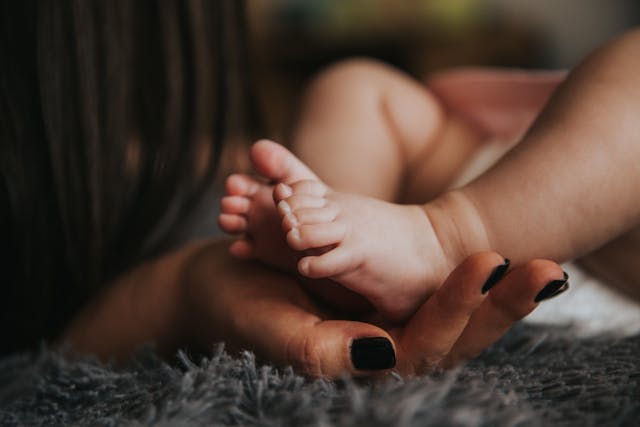Experiencing a little anxiety from time to time is normal. It’s part of life. Anxiety can be felt similar to other emotions like happiness, sadness, and jealousy.

Certain life events like a big test in school, a presentation at work, or news about a loved one being sick can bring on feelings of uncertainty. And with uncertainty comes feelings of anxiety.
Another big cause of anxiety can be life changes. A big life change is welcoming a newborn. Postpartum anxiety is real and something that a lot of new parents, especially first-time parents, can struggle with.
Let’s learn more about some of the signs of postpartum anxiety.
What is Postpartum Anxiety?
Postpartum anxiety is a type of anxiety that can occur in individuals who have just had a baby. Similar to other types of anxiety, postpartum anxiety involves constant and uncontrollable fears and worries associated with a newborn baby.
Having a new baby can bring a lot of unknowns and changes. Having anxiety as a new parent is completely normal. If that anxiety is persistent and the worries or fears cannot be controlled or stopped, it may be a sign that there’s a larger issue at play. That could be an indicator of postpartum anxiety.
The Cause
The main difference between generalized anxiety disorder and postpartum anxiety is that postpartum anxiety occurs and is related to having a baby. Postpartum anxiety can be common, especially in new and first-time parents. Several factors can lead to someone developing postpartum anxiety. These are some of the most common causes or risk factors of post-partum anxiety:
- Difficult pregnancy
- Health issues
- History of mental health conditions
- Hormone changes
- Lack of sleep
- Little to no support system
- Previous history of child loss
- Stress
- Traumatic pregnancy or birth
- Unexpected pregnancy
- Unstable finances, job, or housing
The Signs and Symptoms
While worry and fear are some of the most common and main signs of postpartum anxiety, the disorder comes with a wide variety of other signs and symptoms. Postpartum anxiety is often known as an invisible or hidden disorder. These are some of the most common signs and symptoms to look out for.
Behavioral Symptoms
- Avoiding certain people, places, or events
- Checking and rechecking
- Overly cautious
- Trying to be in control of everything
Emotional Symptoms
- Anger
- Fear
- Feelin on edge
- Fixating on the negative of situations
- Inability to move on from negative thoughts
- Obsessing over fears and/or worries
- Racing thoughts
- Unable to calm down
Physical Symptoms
- Blood pressure spikes
- Changes in appetite or eating habits
- Difficulty falling asleep or staying asleep throughout the night
- Fatigue
- Fidgeting
- Increased heart rate
- Insomnia
- Muscle aches and pains
- Nausea
- Shakiness
- Shortness of breath
- Sweating
Treatment Options
Postpartum anxiety is a common and treatable condition. There are lifestyle changes that you can make on your own end to get ahead of, help, or manage some of the signs and symptoms that you may be struggling with. These are a few of the different treatment options for postpartum anxiety:
- Eating a healthy and well-balanced diet
- Moving your body
- Skin-to-skin contact with your baby
- Support groups
- Therapy
When to Seek Help
If you suspect that you or a loved one are struggling with signs and symptoms of postpartum anxiety, it’s important to know that you’re not alone. If some of these signs and symptoms are present, it’s important to seek help as soon as possible. Working with a licensed and trained mental health professional can help you get back to feeling like yourself again. Don’t delay in getting the help that you need and deserve. When you’re ready, we’re here for you. Reach out today to set up an initial consultation for postpartum counseling or anxiety therapy.
Click here for more information on Perinatal Mental Health.

